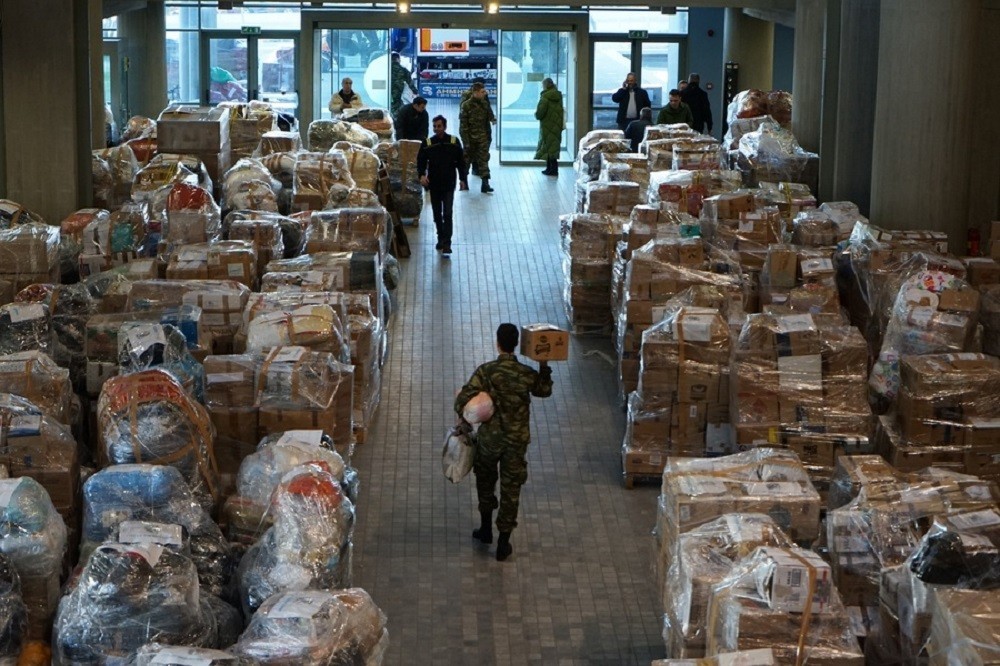
Tsipras met with Merkel, Cameron on Syria donors conference sidelines
ANA-MPA — In his meeting with German Chancellor Angela Merkel here on Thursday, Greek Prime Minister Alexis Tsipras noted that disagreements between the institutions must not be allowed to delay the review of Greece’s programme, Greek government sources said. Tsipras met the German chancellor on the sidelines of the Syria donors conference taking place in London.
Their discussion mainly focused on the refugees issue, though they also discussed the progress of Greece’s fiscal adjustment programme.
According to the sources, the Greek prime minister highlighted the positive signs indicating that the Greek economy might be returning to growth, such as an increase in tax revenues, the 97 pct absorption rate for European funds, the creation of 170,000 additional jobs in 2015 and the successful recapitalisation of Greece’s banks, as well as the closing of agreements in the energy sector that could make Greece an energy hub.
Merkel and Tsipras also discussed Greece’s proposals for reforming the pension system, the same sources said, with Tsipras noting that the proposal was “within the framework of the agreement” and pointing out that the institutions had had the Greek proposal since the start of the year.
“I do not understand why there are delays,” Tsipras was quoted as saying by the sources, while adding that disagreements between the institutions representing Greece’s creditors should not be allowed to delay the review of the country’s programme.
Merkel asked the Greek prime minister about the domestic social and political situation in Greece, the sources said.
On the refugee issue, government sources said that Merkel asked that the Greek hotspots be completed by February 18, in time for the European Council in Brussels. The government has repeatedly said that it will have implemented its commitments by that date, they noted.
The Greek government has also underlined that, once the Italian prime minister lifts obstacles to financing, there must be immediate implementation of the agreements in the EU-Turkey joint action plan. Greece is additionally asking for full implementation of the Greece-Turkey readmission protocol and pushing strenuously for the implemenation of a refugee relocation tool that is currently moving at negligible rates.
The refugee issue was also discussed during a meeting between Tsipras and UK Prime Minister David Cameron. According to government sources, Cameron expressed his full support for Greece and an agreement was reached on setting up a bilateral team with British experts with knowhow in the readmission of Pakistanis, who will soon be coming to Athens.
The UK also offered assistance to the Greek coast guard in the form of personnel and on a technical level, they said.
On ‘Brexit’, Tsipras commented only that “we are not in favour of exits,” the sources added.
Tsipras was also scheduled to meet European Parliament President Martin Schulz.
Addressing the ‘Supporting Syria and the Region’ conference, Tsipras urged the international community to adopt a “long-term, strategic approach,” to the still-unfolding Syrian refugee crisis, focused on “effective and humane management of refugee flows.”
“The Syrian crisis has humanitarian consequences that will stay with us for decades. We cannot deal with them by building walls or pushing back people in the sea and risking deaths. We cannot push people from country to country, as if they are someone else’s responsibility,” he said, addressing the donors conference.
“I wonder what would have happened to millions of Syrians if Turkey, Jordan or Lebanon had decided to build walls or if all of Europe had said : ‘Refugees aren’t welcome here. What happens in the Mediterranean is not our problem,'” he added, pointing out that the Syrian conflict was now in its sixth year “with no end in sight”.
“As the UN Secretary General said, the international community has a heavy responsibility for this crisis. We cannot afford to see the consequences of the crisis only in terms of geopolitics and public order,” Tsipras pointed out. He also stressed the heavy burden that the refugee crisis had placed on cash-strapped Greece and especially the Greek islands:
“Greece has experience first-hand the humanitarian consequences of this crisis, and we insist on dealing with this challenge with humanity and on the basis of international and European values. Since July we have faced flows of over 900,000 people, of which around 500,000 were Syrians.
“The cost of managing these flows and the burden on state capacities has been enormous. The coast guard has rescued more than 150,000 migrants, many of our islands have hosted more people daily than their population. And the people of Greece are doing all they can to support Syrian refugees.”
Tsipras called for a long-term approach and a “response that focuses on cooperation with and assistance to countries that neighbour Syria, which carry an enormous burden of millions of refugees.”
He called for pledges that ensure the integration of refugees in these countries while stemming migration flows.
“We have discussed relevant projects on the basis of the EU-Turkey action plan and we must work harder for this plan to succeed. We must push for education programmes and brave economic initiatives that create employment opportunities in Jordan and Lebanon, we must work on a robust resettlement programme to Europe and other countries,” he said.
“At the same time, we need to press and support UN talks for a political settlement to the Syrian conflict that will end all attacks against civilians and confront terrorism. A settlement that will create conditions for reconciliation and will return civilians to their homes,” he added, announcing that Greece pledges 300,000 euros to the UN for 2016.
“It is a symbolic sum but the daily struggle of the Greek people to support and host refugees is not symbolic it is priceless,” he said.

